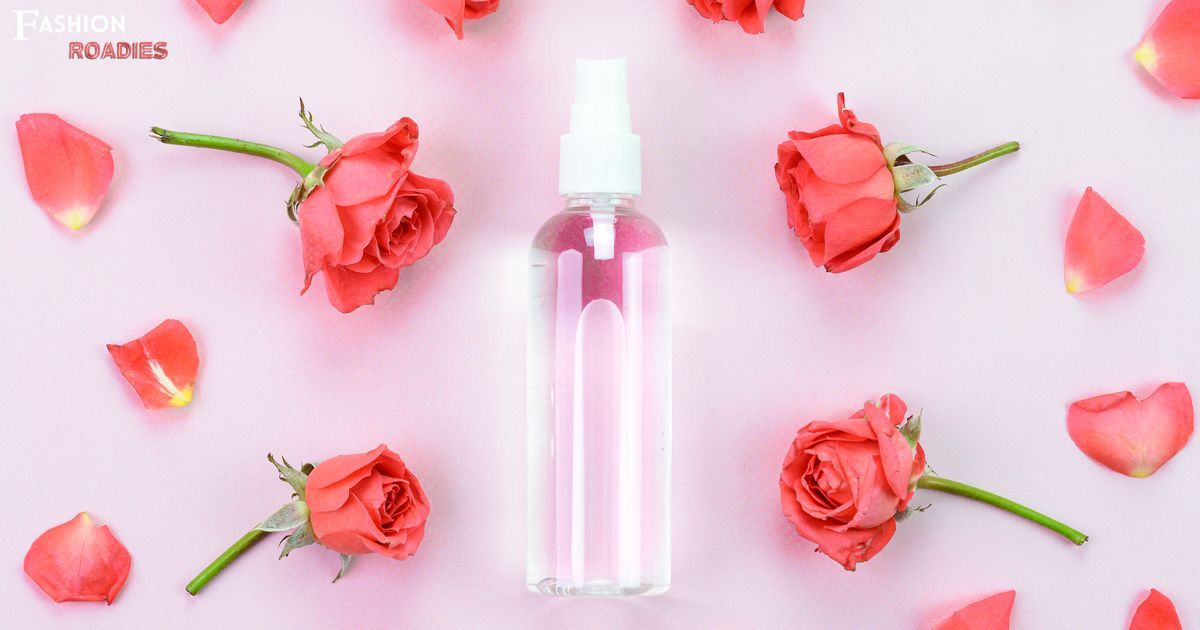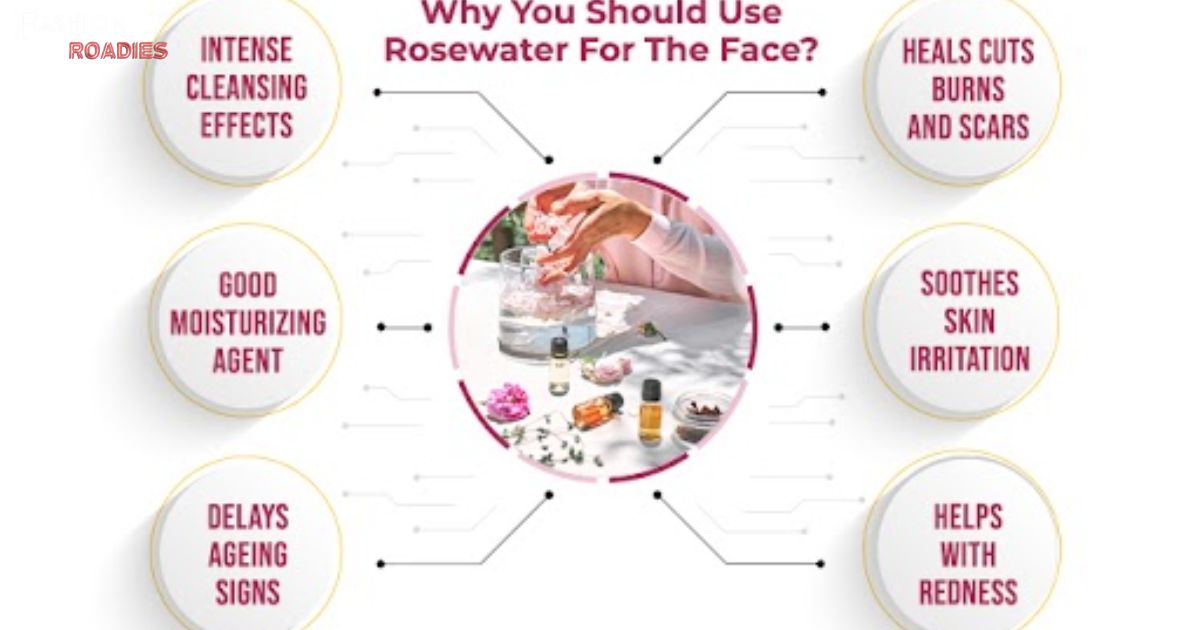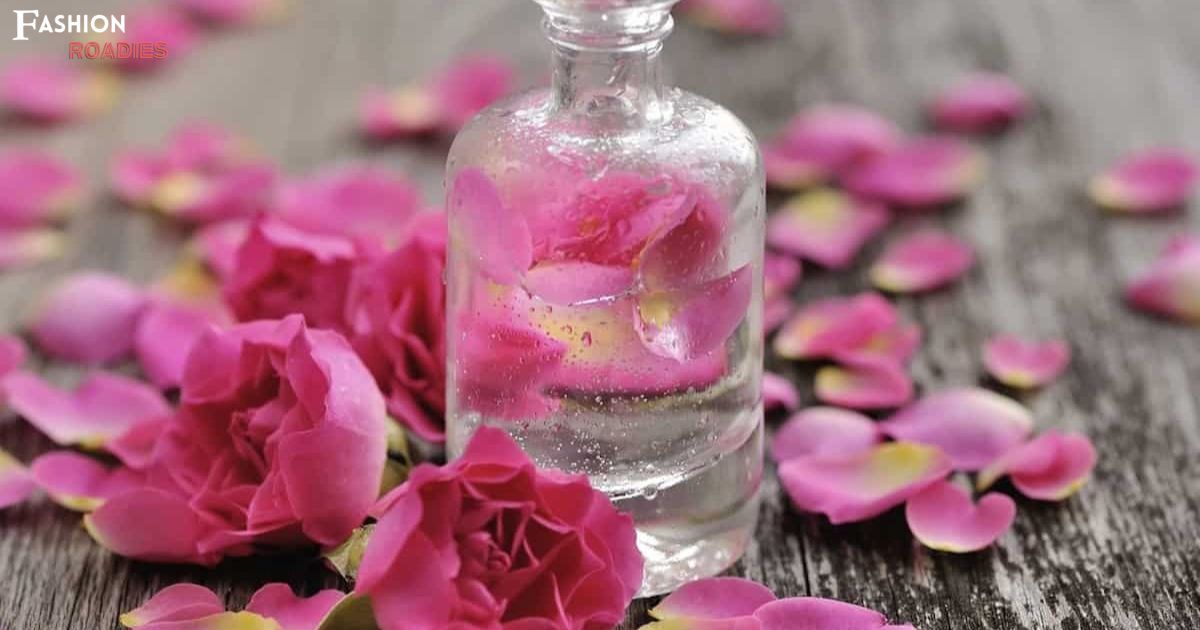Rose water, a fragrant liquid made from rose petals, has been cherished for centuries. Renowned for its aromatic and therapeutic properties, it’s a popular ingredient in skincare and culinary practices.
Imagine a world where a simple flower can transform water into a potion of beauty and health. Welcome to the enchanting realm of rose water. Derived from the delicate petals of the rose plant, rose water is more than just a pleasing scent. It holds a history rich in tradition and a myriad of benefits, from soothing skin to tantalizing taste buds. Let’s delve into its wonders.
Advantages of Applying Rose Water to Your Face
Here are some advantages of applying rose water to your face:
Soothing Sensation
Rose water possesses natural anti-inflammatory properties, making it an excellent choice for soothing skin. Whether you’ve faced sun exposure, irritation, or redness, applying rose water provides a calming effect, leaving your skin feeling relaxed and revitalized.
Hydration Boost
The hydrating properties of rose water help replenish moisture in your skin. Its lightweight nature allows for quick absorption, leaving your skin feeling dewy and hydrated. Regular use can contribute to maintaining a healthy moisture balance.
Natural Toner
Acting as a natural toner, rose water helps tighten pores, resulting in a smoother complexion. It gently removes residual dirt and oil, promoting a cleaner and more refined skin texture. Incorporating it into your routine can contribute to a more even skin tone.
Anti-Aging Properties
Packed with antioxidants like vitamin C, rose water helps combat free radicals, reducing the signs of aging. Regular application may help minimize the appearance of fine lines and wrinkles, promoting a youthful and radiant skin texture.
Makeup Setting
As a makeup setting spray, rose water not only helps set your makeup for a longer-lasting finish but also adds a subtle and natural glow. Spritzing a bit of rose water can refresh your makeup throughout the day.
Gentle Cleansing
Rose water serves as a gentle and effective cleanser, suitable for all skin types. It removes impurities without stripping away natural oils, making it an ideal choice for daily cleansing. Its mild nature is particularly beneficial for those with sensitive skin.
Reduces Puffiness
The cooling and soothing properties of rose water make it effective in reducing puffiness, especially around the eyes. Applying chilled rose water with a cotton pad can help alleviate swelling and refresh tired eyes.
Balances pH
Rose water helps maintain the skin’s natural pH balance. This is crucial for a healthy skin barrier, as an optimal pH level ensures that the skin can better defend itself against external aggressors, preventing issues like dryness and sensitivity.
Anti-Inflammatory
Rose water’s anti-inflammatory properties make it beneficial for calming various skin conditions, including redness and inflammation. Whether dealing with minor irritations or conditions like eczema, rose water can provide relief.
Aromatherapy Benefits
Beyond its skincare advantages, the natural fragrance of rose water has aromatherapy benefits. Inhaling the delicate floral scent induces a sense of calm and relaxation, making it a delightful addition to your skincare routine for both the body and mind.
Utilizing Rose Water in Your Facial Care Routine
Refreshing Facial Mist: Spritz rose water directly onto your face for an instant and refreshing pick-me-up, especially on a hot day or when you need a quick revitalization.
DIY Face Mask: Combine rose water with other natural ingredients like honey or aloe vera to create a hydrating and soothing face mask. Leave it on for 15-20 minutes before rinsing.
Toning Step: Use rose water as a toner in your skincare routine. Apply it evenly to help tighten pores and create a smooth canvas for subsequent products.
Hair Rinse: After washing your hair, use rose water as a final rinse. This adds a subtle fragrance and helps condition your hair, leaving it soft and manageable.
Nighttime Relaxation: Before bedtime, apply rose water to your face. Its calming properties can contribute to a more relaxed evening routine, promoting a peaceful sleep.
Areas To Avoid Rose Water Application
- Open Wounds or Cuts: Avoid applying rose water to open wounds, cuts, or any broken skin. Allow these areas to heal without introducing substances that may cause irritation.
- Eyes: Be cautious when applying rose water around the eyes. Avoid direct contact with the eyes, and if accidental contact occurs, rinse thoroughly with clean water.
- Allergic Reactions: If you have a known allergy to roses or floral extracts, perform a patch test before applying rose water to your face or skin.
- Infants and Young Children: Exercise caution when using rose water on infants or young children, especially on their faces. Consult with a pediatrician before incorporating it into their skincare routine.
- Contaminated Products: Ensure that the rose water product you use is pure and free from additives or contaminants. Low-quality or adulterated products may cause adverse reactions.
- Unreliable Homemade Products: Avoid using homemade rose water if you are uncertain about the quality of the ingredients or the preparation process. Commercially available, reputable brands are a safer choice.
Side Effects Of Rose Water
- In rare cases, individuals may experience skin irritation or redness. This is more likely to occur in those with sensitive skin or allergies.
- If you have a known allergy to roses or floral extracts, using rose water may trigger an allergic reaction. Perform a patch test before widespread use.
- Avoid direct contact with the eyes, as rose water may cause irritation. If accidental contact occurs, rinse the eyes thoroughly with clean water.
- Some individuals may develop rashes or experience itching, particularly if they have a sensitivity to floral extracts.
- While rose water is generally non-comedogenic, some people with very acne-prone skin may find that it doesn’t agree with their skin, leading to breakouts.
To Minimize The Risk Of Side Effects
Choose high-quality, pure rose water without additives or synthetic fragrances. Perform a patch test by applying a small amount to a small area of skin to check for any adverse reactions before widespread use.
If you have specific skin conditions or concerns, consult with a dermatologist before incorporating rose water into your routine. If you experience persistent or severe side effects, discontinue use and seek advice from a healthcare professional.
Conclusion
Rose water is a versatile and natural beauty elixir. It benefits all skin types, providing hydration, reducing redness, and promoting a healthy glow. Use it as a toner, mist, or skincare ingredient for timeless beauty.
Choose high-quality rose water for maximum benefits. Understand its uses and ensure authenticity. Harness its power to enhance your skincare routine. Experience the subtle, floral magic of rose water, a cherished beauty staple for generations. Reach for it next time for a natural and refreshing boost.
Frequently Asked Questions
What is special about rose water?
Soothes Irritation & Redness because it can help heal wounds, rose water is a must-have ingredient to include in your daily routine if you have blemish-prone skin. Its vitamin C content helps to calm itching and irritation caused by eczema, rosacea or psoriasis.
Is rose water good for skin whitening?
Rose water isn’t good for skin whitening but does help in lightening skin pigmentation and restoring the pH balance of your skin. It also unclogs pores and removes dirt making your skin appear lighter.
Can I use rose water after face wash?
Wash your face with your normal cleanser, then dab your face with rosewater. Rosewater will help remove the last of the oils and debris from your pores and calm your skin before bed.










